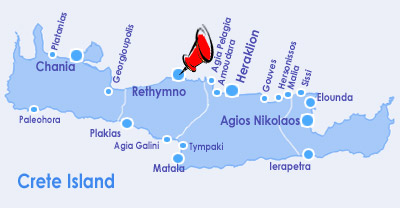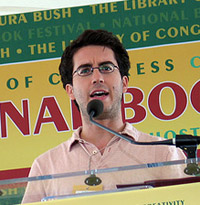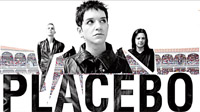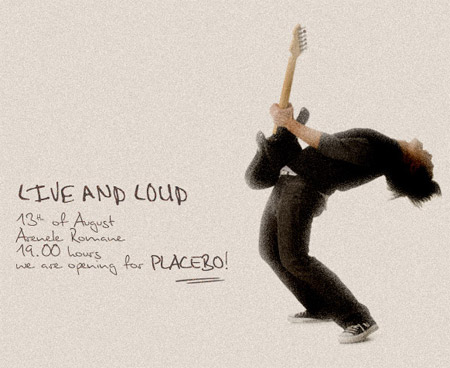Owlspotting is on vacation…
…and will return Aug. 25.

…and will return Aug. 25.

 In Romania we read a lot of literature by dead white guys even though a lot of modern literature is being translated. One author that hasn’t had the pleasure of a translation yet is Jonathan Safran Foer (see photo), who penned the gorgeous “Everything is Illuminated” and the mind-blowing “Extremely Loud and Incredibly Close.”
In Romania we read a lot of literature by dead white guys even though a lot of modern literature is being translated. One author that hasn’t had the pleasure of a translation yet is Jonathan Safran Foer (see photo), who penned the gorgeous “Everything is Illuminated” and the mind-blowing “Extremely Loud and Incredibly Close.”
I just finished reading the second one; a book that follows nine-year-old Oskar Schell’s quest to understand the death of his father in the 9/11 terrorist attacks. Oskar’s mission spans the whole city of New York and involves dozens of people named Black, who Oskar seeks out because he is trying to find the origin of a mysterious key found in an envelope that had “Black” inscribed on it.
Here is Oskar talking to one of the Blacks, an old reporter who had fought three wars and had passed the 100 mark. Black tells Oskar about one of the stories he reported on when he was young and makes a heart-warming point about the importance of stories. The sucker for stories in me fell for this one right away:
“I once went to report on a village in Russia, a community of artists who were forced to flee the cities! I’d heard that paintings hung everywhere! I heard you couldn’t see the walls through all of the paintings! They’d painted the ceilings, the plates, the windows, the lampshades! Was it an act of rebellion! An act of expression! Were the paintings good, or was that beside the point! I needed to see it for myself, and I needed to tell the world about it! I used to live for reporting like that!
Stalin found out about the community and sent his thugs in, just a few days before I got there, to break all of their arms! That was worse than killing them! It was a horrible sight, Oskar: their arms in crude splints, straight in front of them like zombies! They couldn’t feed themselves, because they couldn’t get their hands to their mouths! So you know what they did!”
“They starved?”
“They fed each other! That’s the difference between heaven and hell! In hell we starve! In heaven we feed each other!”
“I don’t believe in the afterlife.”
“Neither do I, but I believe in the story.”
Do you have your balls on you? You do? Then charge ’em and slap ’em on because you’ll need them powered up for this parking adventure.
There are few things that happened to me since I returned home that have made me as mad as this. It happened twice last week when I was cruising the streets of the capital with Andrei, looking for food. We were looking for a parking spot one night, when this guy suddenly starts pointing to a spot he was sitting in. He was not working for the city and was not an employee of a private company handling parking either. He was just this random dude holding a parking spot.
Andrei said we need to give him 1 RON (30 cents). I was hungry and tired and didn’t think much of it, although it did seem strange we’d pay a guy for a public parking spot.
The next day, it all became clear. We were going out for lunch and suddently a relatively large mean-looking man jumps out of a parking spot. He motions towards the spot, which had a plastic crate in the middle of it to prevent drivers from just pulling in. We’re again talking public parking, probably paid parking, but this guy was obviously his own master.
Andrei says we have to give him 1 RON.
“Why?” I ask. “Isn’t this public parking?”
“Yeah,” Andrei says. “But he’ll likely scratch your car if you leave it here without paying.”
I was getting mad. The guy approaches the car and Andrei hands him 1 RON.
“How long will you be staying?” he asks.
“30 minutes,” Andrei replies.
“Then I want 3 RON ($1),” he says.
Andrei starts laughing. He’s done this countless times and knows that if he found a parking agent it wouldn’t be more than 1,5 RON. He says he won’t pay that much and the guy gets mad and starts waving his plastic crate around demanding we move the car. We take the 1 RON back and move out of his zone.
Apparently he was just one of many angry-looking dudes all around downtown Bucharest that block parking spots with crates, chairs or their own bodies. Parking is scarce and this is how they make money. They take over the spot and demand cash. Andrei and other people told me that if you don’t pay them or if you argue your right to park with them, they’ll scratch your car, or slash your tires.
It wasn’t the amount of money I was angry over. It was the idea that someone would claim public space and demand money from you if you wanted to use it.
“What about police?” I asked. “Can’t they just take these dudes out in one day?”
My lunch companions stared at me as if I had just fallen off the moon. Didn’t I know police doesn’t deal with small nuissances? Besides, cops probably get kicksbacks from these individuals, they said. Sure you can fight them, they added. But if you don’t come off as more threatening than they are (as in “If I find a scratch on my car, I will find you and bust you open and then I’ll bust open the rest of your f’n family”) then you don’t really want to take a chance.
So if you really need to park, you’ll park. And when the dude walks over to your window, make a decision. Strap on those balls and take charge, pay or move the car to a place he hasn’t occupied and curse the hell out of the situation. We chose door number 3.
 The Placebo concert in Romania was supposed to be a landmark musical event in Romania–proof that not only “dead” bands make a stop in our country. But the Placebo concert was a weak affair. The organizers did a horrible job planning the event–it took two hours to have people trickle in through one entrance, like lambs at the slaughter. If anything would have happened inside, there wouldn’t have been a way out (creepy, huh?).
The Placebo concert in Romania was supposed to be a landmark musical event in Romania–proof that not only “dead” bands make a stop in our country. But the Placebo concert was a weak affair. The organizers did a horrible job planning the event–it took two hours to have people trickle in through one entrance, like lambs at the slaughter. If anything would have happened inside, there wouldn’t have been a way out (creepy, huh?).
It also became obvious the organizers snatched Placebo after they learned the band was playing at the Sziget festival in Hungary (hey dudes, don’t you want to stop in Bucharest?). It also became obvious Placebo were not booked for a too involved show, barely acknowledging the crowd. Sure they played like pros and but they played for themselves. They ran through a set made up of songs almost entirely from their last record, Meds, had technical problems and played downtempo versions of their more energetic songs. They also skipped some classics and their actual playing time came in a little over an hour.
I believe Molko and co. were saving themselves for Sziget where they play tonight. Compared to what we expected from a band like Placebo playing in front of 5,000 people, we got the scraps.
ab4 played a short opening set–all but one song were in English. They were cute, mosty because I haven’t seen them in forever.
Elle wrote this article about Romania after visiting for the first time in december 2004. It originally appeared here.
Romania is a filthy, foul-smelling, burnt-out pit, with beggars and thieves lurking in its every piss-soaked alley and behind its every news camera, state bureau and cash register. Anyone who would even think of visiting, much less living there, belongs in the country’s communist-era mental hospitals. There! Are you happy now, you crazy Romanians?
I am still recovering from the jet lag of my month-long visit to my boyfriend’s homeland for the winter holidays. We ate a lot and drank a lot (“mancam!” and “bem!” were some of my very first Romanian words) and of course, met a lot of people. By “a lot” I mean family reunion meets college reunion meets job search networking.
My dear friends, many of you seem to think you’re unique. You’re not. Nearly every person I met, whether we were in a bar or at a dinner table, and whether in English or my boyfriend’s translations, immediately said, “So, how do you like Romania?”
At first I answered this question freely, offering my big first impressions and little observations of cultural differences, but I learned quickly to be more careful with my words. No Romanian wants to hear how beautiful his country is.
“But aren’t you shocked by the terrible poverty?” erupted from the lips of a guy who had been speaking through my boyfriend for the past hour and a half. (At that moment I was more shocked that you put corn on pizza, but that’s another story.) Hmmm, I thought. How to answer this one in an easily translatable sound bite?
“Not really,” I said. “There’s poverty in America, too, you know.” This was met with a smirk I have come to know well, distinctly Eastern European look of disdain, and from what I could make out the conversation then moved on to cell phones. Or cars. Or something.
Sitting there in my uni-linqual prison, I decided to change all future responses to “The Question” to something vaguer, mellower, shorter. “I like it” seemed like it might pass, allow me to weasel out of blame for exploitative Westerners or post-communism malaise. I tried it out.
“How could you possibly like it here?!?!” At first this recurring exchange was interesting; the many possible cultural implications gave me something to think about as the conversation inevitably drifted into rapid Romanian from which I could only pick out the occasional curse word. But eventually it became annoying, really annoying, and I joked that I should have worn a fat suit and carried a wad of $100 bills in my front pocket to blow my nose with. Sigh, maybe next time.
“You just haven’t seen the really poor people yet.” Well, I did see a guy walking down the street on stumps where his knees should have been. But that was on my way past Escada, Lacoste, Sephora, Adidas and a few crowded jewelry stores advertising Gucci and friends. I guess the thousands of people rushing past him didn’t really see the poor people either.
Aahhh, the lubricating effects of capitalism. It makes it so much easier to walk past the guy with the stumps.
So here is that crushing indictment of Romania you’ve all been waiting for: the most disappointing thing about your country is that it’s so much like America. (There, I said it! Ha!) It’s pretty easy to walk past the guys with stumps in my hometown, too.
What’s that? You didn’t see One-Armed Steve on MTV? Well, he was quite popular in the freshman dorms of my university in Atlanta. Steve made his cash after dark buying under-aged students beer at the gas station, as long as they tipped him enough to buy a couple packs of cigarettes. His day job involved standing between the traffic lanes at a busy stop light carrying a “VIETNAM VETERAN” sign and pointing to a cup with the nub that was once his right arm. Sound familiar?
To hear Romanians talk, you’d think they invented the art of amputee begging. That and a thousand other annoyances associated with life among modern humans: crowded buses, rude sales people, smelly garbage, silicon-enhanced news, stupid cops, corruption, public urination.
Allow me to set the record straight — assholes are everywhere! Your only real choice in the matter is what language you prefer to be offended, solicited, or assaulted in. Or, what language you want to be told to get a job, take a bath, or hurry up and die in.
Other than that, Romania is gorgeous, just like my country, and I suppose, just like the Sudan.
A self-conscious Romanian joke says we Romanians are expert in everything. When confronted with this issue-usually when guests on talk-shows give their all on topics they know nothing about–my dad loves to play on that and say things like: “I’m the best soccer player among doctors and the best doctor among soccer players.”
Yesterday I had my own shot at becoming an expert and breaking into mainstream Romanian journalism. Here’s how it went down:
My friends are journalists. The friends of my friends are journalists. We are so surrounded by journalists we talk about little else (except maybe music–bad music that is). That’s the context of this story. Yesterday my friend Adi got a call from a broadcast journalist we went to school with. She was looking for me because she was in need of an expert. Adi tells her: “You know, he’s against being on television, but I can have you talk to him and let him turn you down politely.”
When I heard the words “being on television” I panicked. I don’t want to be on television. The first time I was interviewed on camera (I was 13) my mouth felt as if I had just scraped it with deodorant. Still, I took the call because we journalists like to help (and sabotage) each other.
Yesterday was the day of the foiled terrorist plot in Britain and our mutual friend was working on the story. They had reporters in London, they had home-grown security experts and they needed someone to talk about what this will mean for security in American airports.
“Do you want to come on TV and talk about security in American airports?” she asked.
“What do I know about security in American airports?” I replied.
“Well, you lived in Washington.”
Good point I thought. I also flew a lot for my job during the past year. Still, does that qualify me as an airport security expert?
“I’m sorry,” I told her. “Besides being scared of being on television, I don’t know that much about security in airports.”
“Don’t worry,” she said. “We can talk to you over the phone and you can go online and read up on things before going on the air.”
Hmmm, I thought to myself. I could–if I wanted to–play the expert. Tempting, but I wasn’t convinced.
“I can’t do it,” I said. “I’m ruining my shot at glory, aren’t I?”
“You are,” she said, launghing.
And we left it at that. I did not appear on television, I did not play my role as an airport security expert and I lost my last chance at eternal broadcast fame.
After I hung up, I started thinking of this little incident from last week when a pretty woman approached me in a club where we were jumping and yelling. “Do you have a minute?” she asked. “Depends on what you need,” I replied. It turns our she was “Simona from PSI,” and she was looking for young people to participate in a round table on subjects they were familiar with. Experts if you will. The roundtables would get media attention and so on.
What were the roundtables that I was so suited for (in her opinion) about?
Sex and clubbing.
I’m the best hardcore clubber among journalists and the best journalist among hardcore clubbers. And I can fake some sexpertise if need be.

In 2000, a couple of friends and I were looking for an unknown Romanian rock band to book for a party we were throwing at school. Someone gave us a demo CD for a band called ab4. We listened, we liked, we paid $300 and we let them rip. At the time, ab4 was nothing if one of the two great Romanian alternative rock bands (sad but true). Omul cu Sobolani was the other one.
In 2003, ab4 released their sophmore album, recorded in English. Because by then I had sort of become friends with the band, I wrote their press kit (my name is on the record-yay!). Then, the band more or less dissapeared. My friends back in Romania say they don’t remember having heard anything about ab4 since 2003 (which in a way is not all that bad considering what happened to OCS’s music).
And then the suprise. This Sunday, in Bucharest, ab4 will be the opening band at the Placebo concert. ab4 lives and will come to Arenele Romane to rock. We are currently playing their songs, some of which are now six years old, and we are ready to rock. You can listen to some songs from their two records below.
Roka on, as the band used to say.
 “Toxic” was released in 2000. The sound on the record was pretty poor, but with the amount of local rock available, who gave a damn. Here are two of the hits from the album:
“Toxic” was released in 2000. The sound on the record was pretty poor, but with the amount of local rock available, who gave a damn. Here are two of the hits from the album:
>> ab4 – Sa.mp3
>> ab4 – Hol.mp3
 “Broken Trust” came out in 2003 and it was ab4’s attempt to make it big outside Romania. Not the most inspired song writing, but good enough:
“Broken Trust” came out in 2003 and it was ab4’s attempt to make it big outside Romania. Not the most inspired song writing, but good enough:
>> ab4 – Born to learn.mp3
>> ab4 – Break.mp3
I’ve spent a couple days in Vama Veche with Andrei and Bogdana, sleeping in cars, drinking, eating and feeling sick (some of us). Vama Veche is to many a non-mainstream paradise of the Romanian coast although its “alternative” status has been under heavy debate for the last five years or so. People campaigning to save it only manage to ruin it further and those gentrifying it can’t wait to topple another underground dinosaur.
Pictures will follow in the next few days, but here is some random trivia about our trip.
Top four words used: The first two would be banned on network television. Soup–in a literal meaning–comes in at number three. Breasts takes four.
Dips in the sea: zero.
Number of algae: Do you want to start a colony?
Bodies sleeping in a car: Three.
Women wearing nothing but thongs: Enough to make a theater seem crowded.
Men wearing nothing: At least one.
Number of times we heard stories about the crowd that is ruining Vama Veche: four.
Number of times we were associated with that crowd: At least once.
Number of photos we snapped: More than 500.
Price of a vodka tonic: 5-7 RON (around $2)
People in line at the pharmacy asking for stomac medicines: 4
Number of people peing on the beach next to you at night: two-three visible on each side.
Cost of visit to public toilet: 1 RON (30 cents).
Cost of one night of stay in someone’s home: 20 RON/person.
Number of mosquitos killed before falling asleep: Upwards of 15.
Number of establishments called “The old sausage”: 1
Number of establishments called “Shire: 1
Number of Green Day songs we heard: At least one per day.
Number of dance clubs: One, hated but active.
Random people asking for money to buy food or alcohol: At night, it was at least one every hour.
Yes, people in Romania have nicknames. The fun thing about them is that sometimes they are just sounds pieced together to sound a certain way (Dudu, Bobo, Lolo etc). A friend of my brother’s has been a nickname magnet over the years. He now has nine and out of respect some people refer to him by all nine. How does all of that sound?
Detzco-Paspartou-Ciupex-Lolo-Concsi-Rupi-Purdi-Carpati…and of course, Patrocle.